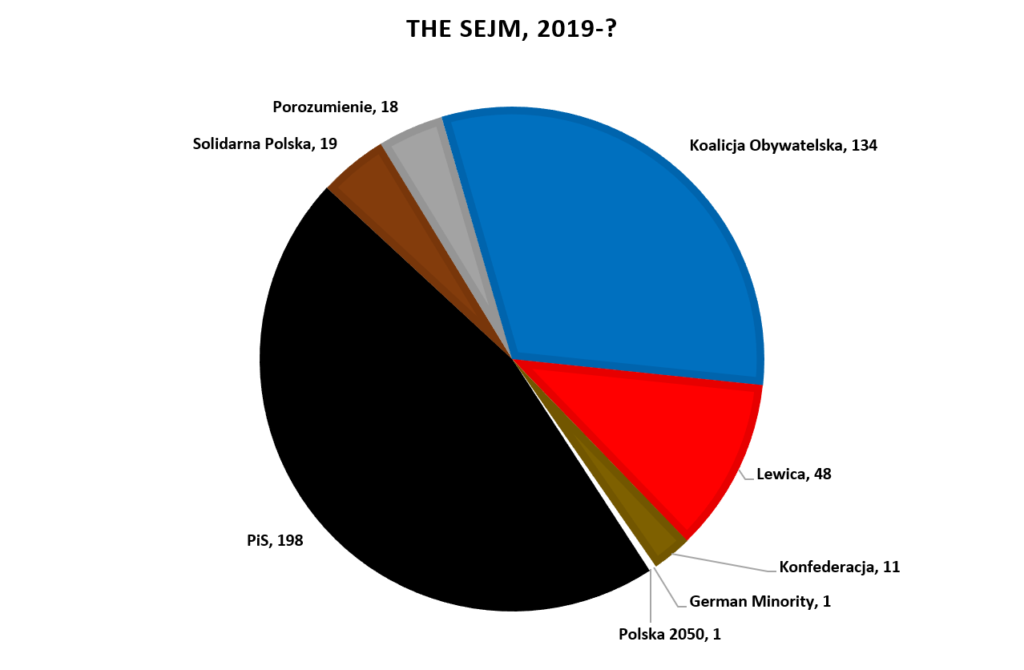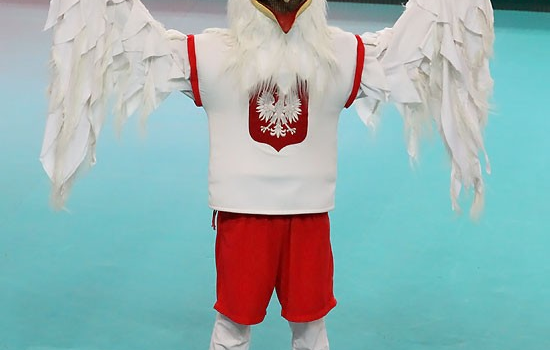
The Disunited Right
Whenever I pretend to be a pundit I usually end up humiliated (Andrzej Duda never had a chance to defeat Bronisław Komorowski, PiS couldn’t do too much damage because they lacked the votes to change the constitution, etc.). But it seems that I may have gotten something right, despite my best efforts. After the elections last fall, I argued that it was going to be very difficult for Kaczyński to sustain discipline and unity within his own camp going forward. The Zjednoczona Prawica (United Right) had really been “PiS, etc.” during the first term, but the elections changed the landscape by increasing the strength of the other right-wing parties, Zbigniew Ziobro’s Solidarna Polska and Jarosław Gowin’s Porozumienie (Agreement). The former consists of ideological hard-liners who resent what they see as compromises made by PiS. For Ziobro, Prime Minister Mateusz Morawiecki is just a technocrat, and not a true believer. On the other side, Gowin casts himself in the Christian Democratic tradition, though he is far, far to the right of Angela Merkel. Perhaps a better parallel would be the Republican party of the US, as it was in its pre-Trump iteration. In other words, Porozumienie advocates social conservatism (what Americans would recognize as a “family values” agenda) combined with a commitment to private business and free markets.
It was easy to forget that Solidarna Polska and Porozumienie even existed as separate entities during PiS’s first term. After last October, however, they increased their parliamentary strength vis-à-vis PiS. If we broke out the three members of the (up until now) United Right, the current balance of power in the Sejm would look like this:

In recent weeks the tensions between Kaczyński, Ziobro, and Gowin have been bubbling to the surface. First came the controversy over the presidential elections, which were originally scheduled for May. Kaczyński wanted to push ahead with the original timetable despite the COVID crisis, using a hastily put together vote-by-mail system, under the management of a newly-appointed postmaster loyal to PiS. The opposition challenged the legitimacy of this sudden change in voting procedures, but more surprising was the fact that Gowin did as well. He insisted on a postponement of the election, and when it became obvious that PiS alone did not have the votes to push forward, the vote was indeed delayed. Andrzej Duda won anyway, though it was much closer than it would have been in May. Gowin actually appeared to be standing on principle: he believed that a victory under those conditions would not be seen as legitimate. He was probably right, and he may have saved Kaczyński from himself. Anyway, in the aftermath of this Gowin lost his position as vice-premier, even though his party technically remained part of the ruling coalition.
As the summer came to an end, the three parties were negotiating about a reconfiguration of the government—a common process after an election, even when the incumbents win. It was reasonably certain that Morawiecki would continue as prime minister, but the balance of the ministerial posts given to the coalition members was in question. This is where the story gets indecipherably complicated, and I won’t even attempt to lay out the many personal conflicts that have been in play. The short version is that Ziobro wanted more authority, and was positioning himself to either 1) merge with PiS and establish himself as Kaczyński’s heir; or 2) build Solidarna Polska so that it could stand alone as an independent party to PiS’s right. Gowin, meanwhile, wanted to get back into government, but on his own terms. Needless to say, Kaczyński wanted to put these two upstarts in their place. Both as a matter of personality and as a matter of ideology, Kaczyński does not tolerate dissert. The foundation of his belief system is that the nation must speak with one voice, and that the state should be disciplined and cohesive. His vision of democracy is that people vote for a leader, and afterwards the losers get in line behind the majority. There is no such thing in his worldview as a “loyal opposition,” which is why he has routinely described his opponents as traitors, foreign agents, criminals, etc. He has paid homage to Carl Schmitt’s idea that politics is about “us” and “them,” and that the ultimate goal was to subordinate others, not compromise and negotiate with them. Given this, there was never any chance that Kaczyński would calmly go forward making deals in order to get his desired legislation passed. In fact, for him any piece of legislation, any state policy, was a secondary concern behind the need for unity and discipline.
Two issues brought the conflict to the surface. First, a law backed by PiS that would give government officials immunity from prosecution for any violations they committed in the course of fighting the COVID epidemic. There are already officially filed charges against Morawiecki for his role in the aborted May election, in which a number of constitutional provisions were violated in the attempt to change the voting procedures. One might think that this is irrelevant, since the primary project of the past four years has been to subordinate the judiciary to political control – a project which has mostly succeeded. Yes, the court system is now largely subject to the will of the Minister of Justice, but that happens to be none other than Ziobro, who despises Morawiecki both personally and ideologically. It is an open secret that Ziobro has been using his position to collect information that he might use someday against Morawiecki and other PiS politicians. Not surprisingly, then, Ziobro does not want the law on immunity from prosecution to go forward.
Meanwhile, this week it was time to vote on a law that was a pet project of Kaczyński himself: a set of new rules to protect animal welfare. It might seem like a small-scale issue over which to break a coalition, but it gained symbolic weight because of the context. The main provisions of the bill would ban the killing of animals for fur, and put a stop to the practice of slaughtering animals without stunning them first in order to reduce their pain. The latter provision would put an end to both kosher and halal slaughter, which is actually a pretty big deal. Although there is are only miniscule Jewish and Muslim communities in Poland, an increasing number of very profitable firms have been exporting to the Middle East, and to Jewish and Muslim communities in Europe. One might have expected there to be antisemitic or Islamophobic overtones to this issue, but as far as I can tell that is not the case. Interviews with both Muslim and Jewish butchers, and the public rhetoric surrounding the bill, seem to indicate that this is indeed an animal welfare measure. Throughout Europe there is a popular view, usually found on the left rather than the right, that ritual slaughter is cruel. Setting this debate aside, by all accounts it is this belief that motivated Kaczynski’s bill.
To make an already long story a little less long, let’s cut to Thursday. The bill came to a vote, and PiS declared that it would enforce party discipline. Despite that, 38 member of PiS, including even the Minister of Agriculture, voted no. Gowin’s supporters abstained. The measure passed anyway, because most members of the opposition supported it (how’s that for irony?).
The past few days have been tumultuous, to put it mildly. Kaczyński has complained that “the tail is trying to wag the dog,” referring to Ziobro’s power grab. Leading members of PiS have said that the coalition is now finished, leaving only two alternatives: a minority government, or snap elections. A minority government would be, in effect, a caretaker administration. It would be nearly impossible to realize Kaczyński’s ambitious second-term plans, above all his goal to muzzle or eliminate Poland’s still vibrant independent media. Snap elections, on the other hand, would probably be disastrous for the right. Taking an average of the past month’s surveys, the entire United Right has 40.8% of the vote. Unfortunately we don’t yet have polling that separates out the three parties of the governing coalition, but it is an open question whether Ziobro and Gowin could independently gain the 5% needed to win seats in the sejm. Perhaps Solidarna Polska could, but Porozumienie certainly could not. Either way, this would leave PiS alone with results in the low 30s at best. Meanwhile, the main parties of the center and left currently have 47% of the vote, though one of them (PSL) is close enough to the 5% mark to raise concerns. In other words, the results of snap elections would be very hard to predict, but the most likely outcome would be that PiS’s rule would come to an end.
I’m feeling very nervous even writing that last sentence. To be clear: I do not think that this is the most probable outcome of the crisis, because I cannot believe that Kaczyński, Ziobro, and Gowin would allow things to get that far. Still, over the past several days the rhetoric has become quite heated between them, and even more so between rank-and-file members of their parties. I think all three have overplayed their cards disastrously (from their perspective), and walking this back will be impossible. My guess is that they will try, but even if they do, there is no longer a united coalition governing Poland. Every piece of legislation will involve careful vote-counting and hard lobbying.
Whatever happens next, the days when the sejm was just a rubber stamp for Kaczyński’s have come to an end.



